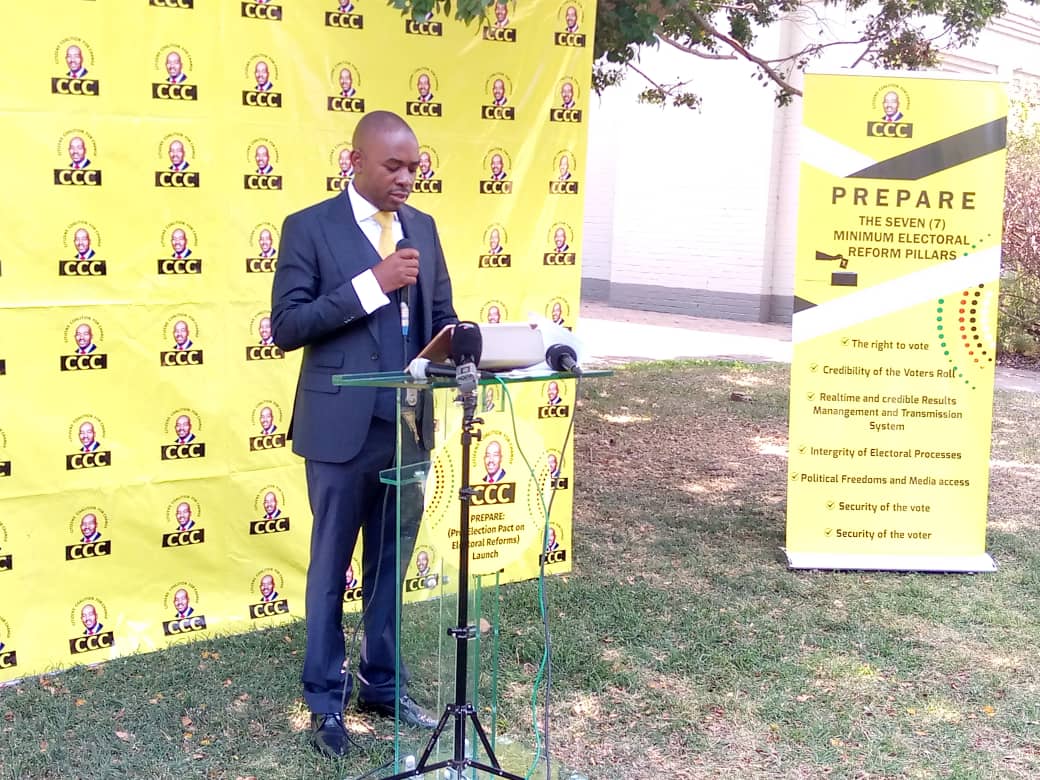
Opposition Citizens Coalition for Change (CCC) leader Nelson Chamisa has blamed the current limited electricity generation on corruption and obsolete equipment which he said needs rehabilitation.
Zimbabwe is currently experiencing one of its worst power crisis with loadshedding lasting up to at least 18 hours a day as a result of the low water levels at the Kariba hydro power station and incessant breakdown at the Hwange thermal power station.
In a statement Thursday, Chamisa said the current energy policies overlook the need for improving renewable energy and addressing of climate solutions.
“The limited generation capacity is attributed to human capital capacity and quality of management due to corruption and cronyism at our utilities, poor financing, water wastage and availability at Kariba Power Station, old equipment which needs rehabilitation and limited coal availability and clean energy issues.
“A New Great Zimbabwe economy needs to be driven by clean, and sustainable energy sources that will achieve net-zero by 2050 and also ensure a decarbonised economy. The Citizens government recognises the importance of expanding installed generation to at least 4,2 mw by the year 2029 which we estimate will cost 4.33 billion USD.
“Current energy policies overlook the need for improving the share of renewable energy in the overall energy mix and addressing issues of Climate Mitigation and Adaptation in this era of climate change. It is not prudent to use a hydropower station like Kariba which was designed mainly for peaking power, as a base load power station,” said Chamisa.
The opposition leader said his government will prioritise a clean energy investment and promote sustainable Feed-in Tariffs (FiT).
“Zimbabwe should focus on driving cost-effective implementation of sustainable energy sources, social upliftment through community involvement, gender equality and employment generation. The renewable energy sector in Zimbabwe should consist of solar, hydro, wind, geothermal and biomass (which includes bagasse (sugarcane based), biogas, and forestry and sawmill waste) all of which have barely been fully exploited.
“Zimbabwe has vast renewable energy resources that are presently underutilized. Our Citizens’ Government will prioritise a clean energy investment that will make power shortages, load shedding and the current dark age a thing of the past. We will lead in the setting of targets for renewable energy based on the Nationally Determined Contributions (NDCs) interventions submitted to the United Nations Framework Convention on Climate Change (UNFCCC), demand-supply scenario, grid absorption capacity, and the economic viability of our utilities to pay for renewable energy electricity from independent power producers (IPPs).
“We will promote sustainable Feed-in Tariffs (FiT) for small hydropower, biomass, and geothermal projects as well as corruption free competitive bidding for solar photovoltaics (PV) and concentrating solar power (CSP), wind and other renewable energy sources. Off-grid energy will be promoted and incentivized to make them a viable option for our Citizens government 100% electrification of Zimbabwe by 2035,” he said.
He added “We will address the socio-economic areas in our energy policies to include affordability and accessibility of energy from renewable sources, employment opportunities, diversity and inclusion especially gender equity, and benefits to children, youth participation, food security, and improved access to basic facilities.”






